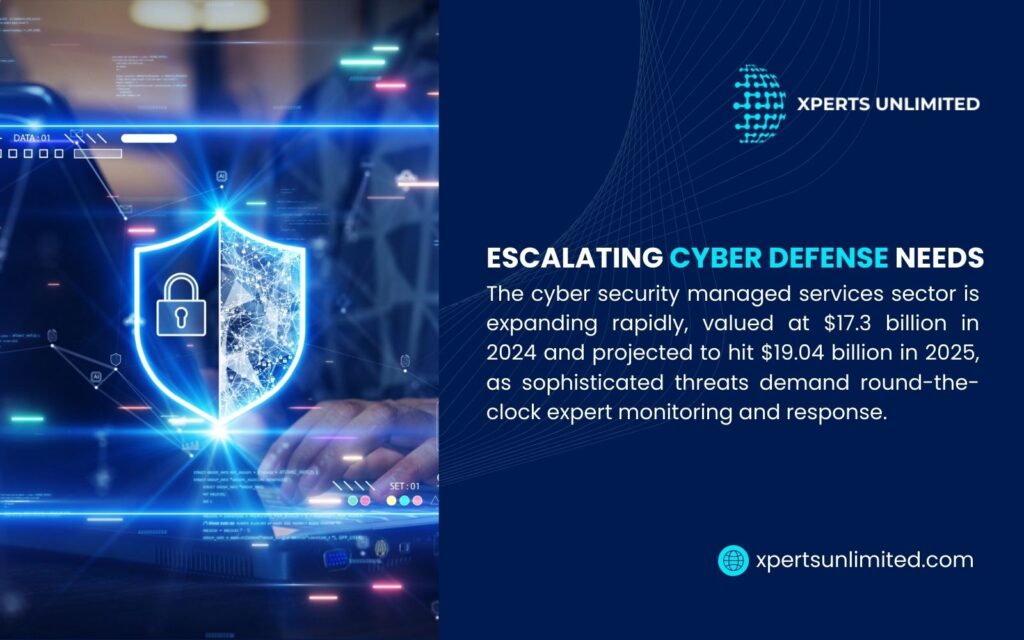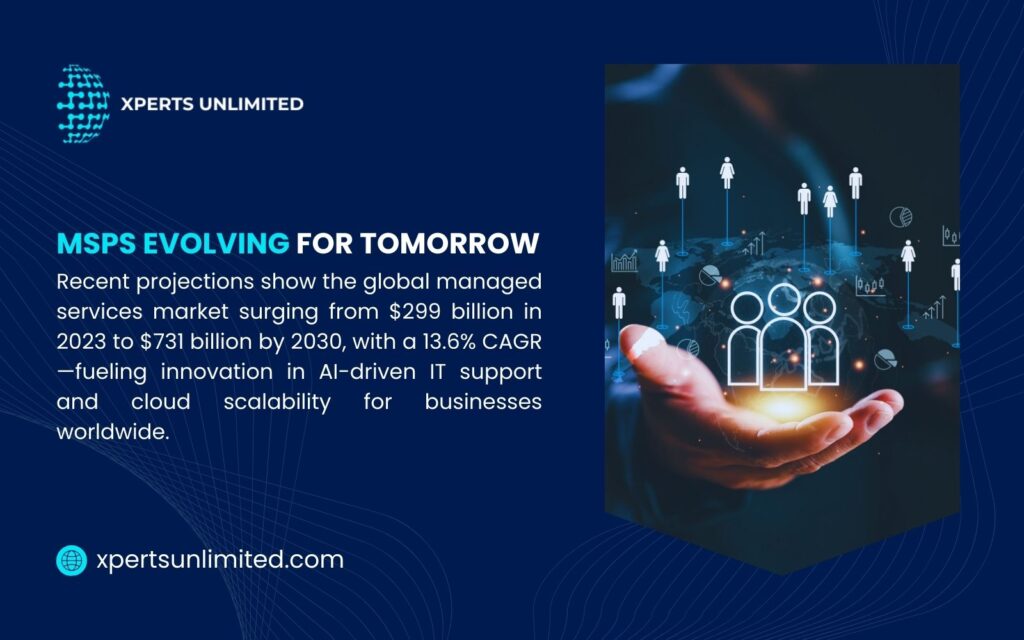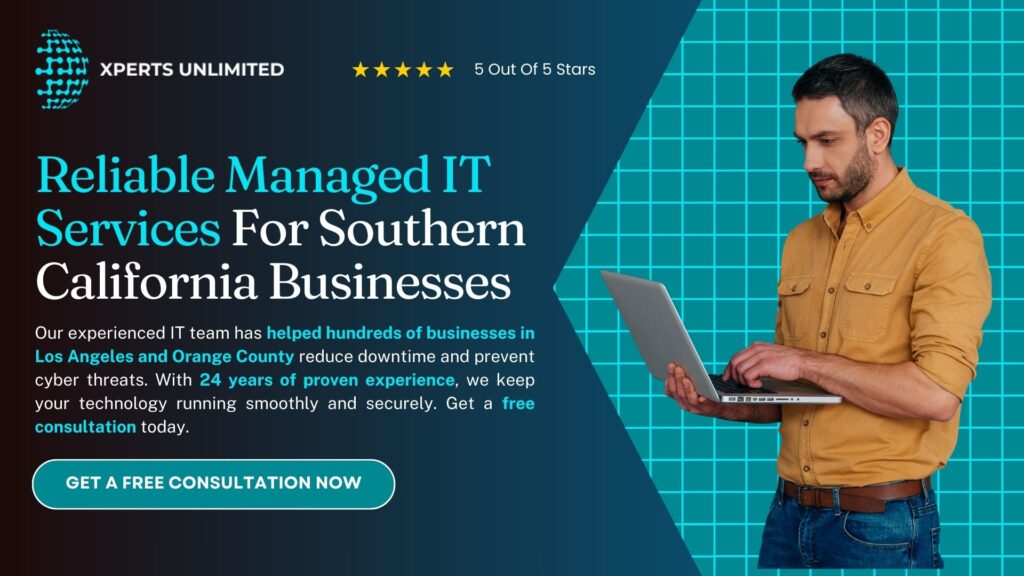Nearly 60% of small businesses that suffer a cyber attack go out of business within six months, and more concerning is that the average cost of IT downtime for small businesses reaches $8,000 in one hour but still most businesses lack IT management strategies.
In this article, you will find the 7 most important aspects of managed IT services and how they will benefit you as a business owner.
What Are Managed IT Services?
Managed IT services are a complete approach where external providers take responsibility for maintaining, monitoring, and managing a company’s IT infrastructure and end-user systems.
Instead of hiring internal IT staff or dealing with technology issues reactively, businesses partner with providers that handle all technology needs in advance.
These services operate on a subscription model, which provides your business with predictable monthly costs, 24/7 monitoring, maintenance, and support.
The managed service provider becomes an extension of your business and manages everything from network security to employee help desk support.
7 Important Aspects of Managed IT Services
1. Proactive System Monitoring and Maintenance
The most important thing about managed IT services is that they watch your systems all the time and fix problems before they happen. Instead of waiting for something to break, they prevent issues from starting.
Managed service providers use monitoring tools to check how your systems are running. When they spot a potential problem, they fix it before it affects your business. This keeps your computers and network running smoothly.
They also do regular maintenance on all your systems. This includes updates, security fixes, and performance improvements. This regular care prevents most IT problems that hit businesses using old-style IT support.
Monitoring Component | Frequency | Business Benefit |
Network performance | Real-time | Prevents slowdowns and outages |
Security threats | 24/7 | Early threat detection and response |
System updates | Scheduled | Maintains security and performance |
Hardware health | Continuous | Prevents unexpected equipment failures |
The importance of managed IT services becomes clear when considering that proactive monitoring can prevent up to 85% of potential IT issues before they cause business disruption.
2. Improved Cybersecurity Protection
Cybersecurity is the most important part of modern IT management. The importance of managed IT services here is huge because cyber attacks keep getting worse and target all types of businesses.
Managed service providers put multiple security layers in place. This includes firewalls, systems that detect intruders, protection for individual computers, and regular security checks. They stay updated on new threats and know how to stop them.
Security monitoring runs 24/7, with experts watching for threats and responding right away. They watch for strange network activity, people trying to break in, and malware trying to infect your systems.
Security Layer | Protection Type | Implementation |
Network Security | Firewall and intrusion prevention | Blocks unauthorized access attempts |
Endpoint Protection | Anti-malware and behavioral analysis | Protects individual devices |
Email Security | Spam and phishing filtering | Prevents email-based attacks |
Data Protection | Encryption and access controls | Secures sensitive information |
Employee security training forms another crucial component, as human error remains the leading cause of security breaches. Managed providers typically include regular training and simulated phishing tests to maintain security awareness.

3. Predictable Cost Structure and Budget Management
One significant advantage of managed IT services is the transition from unexpected IT bills to predictable, fixed monthly costs. With old-style IT support, you get hit with expensive repair bills when systems break down.
Managed IT services use flat-rate pricing that covers all your maintenance, monitoring, and support. This means no surprise repair costs and easier budget planning.
With predictable costs, you can plan your IT budget better and spend money on growing your business instead of emergency repairs. Most businesses actually spend less on IT while getting much better service.
Cost Comparison | Traditional IT Support | Managed IT Services |
Pricing Model | Hourly rates plus parts | Fixed monthly fee |
Emergency Repairs | High cost, immediate payment | Included in monthly fee |
Budget Planning | Unpredictable expenses | Predictable monthly costs |
Total Annual Cost | Often higher due to emergencies | Lower with better service |
Cost savings extend beyond direct IT expenses to include reduced downtime costs, improved employee productivity, and avoided expenses from security incidents.
4. Access to Enterprise-Level Expertise
Technology changes fast, and staying current requires learning about cybersecurity, cloud systems, networking, and regulations. Managed service providers have teams of experts who stay up-to-date in these areas.
These experts know both the technical side and how technology helps your business reach its goals. They help you make smart decisions about what technology to buy and use.
Most businesses, especially smaller ones, can’t afford to hire experts in every area of technology. Managed services give you access to all this expertise for much less than hiring your own specialists.
5. Scalability and Business Growth Support
The fifth important aspect is how managed IT services grow with your business. When your company expands, your technology needs change too, and managed services adapt quickly to support you.
When you hire new people, they need computers and access to your systems. When you add new locations, they need reliable internet and security. Managed services handle all this without slowing down your growth.
They also help you pick the right technology as you grow. Maybe you need new software for more employees, or better security as you handle more customer data. Managed providers know what works for growing businesses and can guide your decisions.
Growth Phase | Technology Needs | Managed Services Solution |
Startup | Basic infrastructure, cost control | Essential services, scalable foundation |
Expansion | Additional users, new locations | Rapid deployment, consistent service |
Maturity | Advanced systems, optimization | Strategic planning, performance tuning |
This scalability ensures that technology supports rather than constrains business growth, allowing companies to focus on core business activities rather than IT management challenges.

6. Business Continuity and Disaster Recovery
Data backup protects you when hardware breaks, hackers attack, disasters strike, or someone makes a mistake. Managed providers set up automatic backups and test them regularly to make sure your data can be recovered.
But it’s not just about backing up data. Business continuity means keeping your business running during any kind of tech problem. This includes having backup systems, other ways to communicate, and clear steps to get back up and running.
They also test these backup plans to make sure they actually work. Too many businesses find out their backups don’t work only when they desperately need them.
Recovery Component | Protection Level | Recovery Time |
Local backups | Hardware failures | Minutes to hours |
Cloud backups | Site disasters | Hours |
System replication | Complete outages | Minimal downtime |
Documentation | Process continuity | Immediate reference |
The cost of implementing comprehensive business continuity measures is typically much lower than the potential cost of extended business interruption.
7. Regulatory Compliance and Industry Standards
The seventh important aspect is staying compliant with industry rules and security standards.
Different industries have specific rules. Healthcare needs HIPAA compliance, businesses that process payments need PCI DSS, and many companies must follow data protection laws. Managed providers know these rules and set up the right controls and paperwork.
They monitor compliance with regular checks and keep all the documentation you need. This reduces your risk of violations and the big fines that come with them.
Most businesses don’t have the expertise to handle compliance properly. This makes managed services essential if you’re in a regulated industry. Violations can cost you thousands in fines and hurt your reputation.
Managed providers also help you prepare for audits and keep all the records you need to show you’re following the rules.

Cost Considerations and Return on Investment
Understanding the average cost of managed IT services requires examining both direct costs and potential savings from improved efficiency and reduced downtime.
The benefits of managed IT services typically outweigh costs through reduced downtime, improved productivity, enhanced security, and avoided costs from system failures or security incidents.
Most businesses find that managed services provide better value than internal IT staff while offering access to broader expertise and more comprehensive service coverage.

Get Reliable Managed IT Services From Experts With 20+ Years Of Proven Results
Xperts Unlimited has been providing comprehensive managed IT services to businesses in Southern California since 2000. Our flat-rate, all-inclusive approach eliminates surprise IT costs while ensuring your technology supports your business objectives.
We serve businesses throughout Los Angeles and Orange County with 24/7 monitoring, proactive maintenance, and expert support. Our team understands the unique challenges facing small and medium businesses and provides scalable solutions that grow with your organization.
Get a free consultation now and discover how our managed IT services can transform your business operations while protecting your valuable data and systems.







